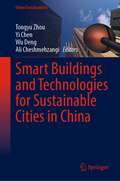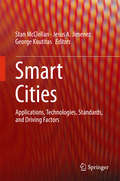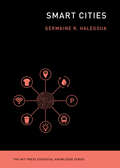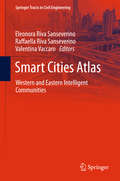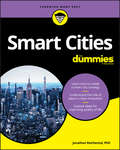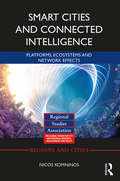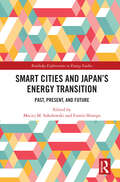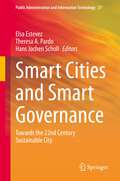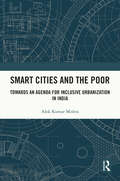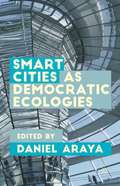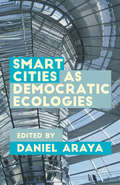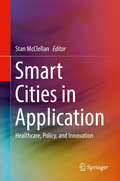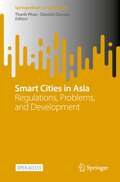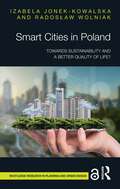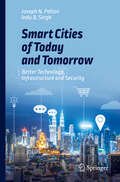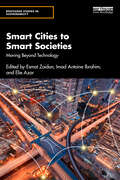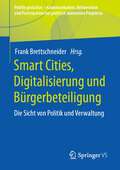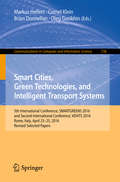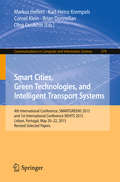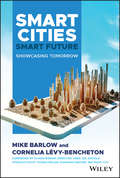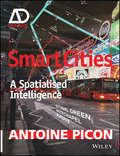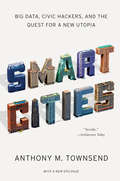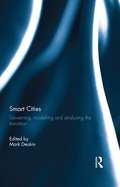- Table View
- List View
Smart Buildings and Technologies for Sustainable Cities in China (Urban Sustainability)
by Ali Cheshmehzangi Wu Deng Yi Chen Tongyu ZhouThis book brings together the insights from professional associations who involved in developing relevant national standards in China, domestic and international scholars who are dedicated to research in related fields, and industry practitioners who have the most hands-on experience. Synthesizing their perspectives, this book discusses the advanced technologies that can meet the requirements for energy efficiency, building performance monitoring and management, and user-centric building services, which are considered the essential components for achieving sustainable and smart cities. Moreover, it provides reflections on the implementation of smart technologies and strategies in practice.
Smart Cities
by Stan Mcclellan Jesus A. Jimenez George KoutitasThis book reviews the applications, technologies, standards, and other issues related to Smart Cities. The book is divided into broad topical sections including Vision & Reality, Technologies & Standards, Transportation Considerations, and Infrastructure & Environment. In these sections, authors who are experts in their fields present essential aspects of applications, technologies, requirements, and best-practices. In all cases, the authors have direct, substantive experience with the subject and present an important viewpoint driven by industry or governmental interests; the authors have each participated in the development and/or deployment of constituent technologies, standards, and applications, and share unique perspectives on key areas of the Smart City.
Smart Cities (The MIT Press Essential Knowledge Series)
by Germaine HalegouaKey concepts, definitions, examples, and historical contexts for understanding smart cities, along with discussions of both drawbacks and benefits of this approach to urban problems. Over the past ten years, urban planners, technology companies, and governments have promoted smart cities with a somewhat utopian vision of urban life made knowable and manageable through data collection and analysis. Emerging smart cities have become both crucibles and showrooms for the practical application of the Internet of Things, cloud computing, and the integration of big data into everyday life. Are smart cities optimized, sustainable, digitally networked solutions to urban problems? Or are they neoliberal, corporate-controlled, undemocratic non-places? This volume in the MIT Press Essential Knowledge series offers a concise introduction to smart cities, presenting key concepts, definitions, examples, and historical contexts, along with discussions of both the drawbacks and the benefits of this approach to urban life.After reviewing current terminology and justifications employed by technology designers, journalists, and researchers, the book describes three models for smart city development—smart-from-the-start cities, retrofitted cities, and social cities—and offers examples of each. It covers technologies and methods, including sensors, public wi-fi, big data, and smartphone apps, and discusses how developers conceive of interactions among the built environment, technological and urban infrastructures, citizens, and citizen engagement. Throughout, the author—who has studied smart cities around the world—argues that smart city developers should work more closely with local communities, recognizing their preexisting relationship to urban place and realizing the limits of technological fixes. Smartness is a means to an end: improving the quality of urban life.
Smart Cities Atlas
by Eleonora Riva Sanseverino Raffaella Riva Sanseverino Valentina VaccaroThe book discusses the concept of the smart city, and is based on a multi-service and multi-sectoral approach to urban planning, including various urban functions and the human capital of cities. The work is divided into three parts. The first is an introductory section which covers definitions, policies and tools used at European level for the development and classification of a smart city. The second presents a selection of examples of Western and Eastern communities, which experienced technologies and strategies that have made them smart. The third describes in detail the main three possible approaches (economical, technological and social) to the smart city concept which are the focus ambits of the holistic concept of smart city. The work provides a good overview of the concept of the smart city, and also offers a critical analysis of the various approaches to smart cities, in order to provide tools to develop solutions that address the smart development of cities with an approach as multi-sectoral as possible. Its accessible language and several examples make the book easy to read and appealing to public administrators, students, planners and researchers.
Smart Cities For Dummies
by ReichentalBecome empowered to build and maintain smarter cities At its core, a Smart City is a collection of technological responses to the growing demands, challenges, and complexities of improving the quality of life for billions of people now living in urban centers across the world. The movement to create smarter cities is still in its infancy, but ambitious and creative projects in all types of cities—big and small—around the globe are beginning to make a big difference. New ideas, powered by technology, are positively changing how we move humans and products from one place to another; create and distribute energy; manage waste; combat the climate crisis; build more energy efficient buildings; and improve basic city services through digitalization and the smart use of data. Inside this book you’ll find out: What it really means to create smarter cities How our urban environments are being transformed Big ideas for improving the quality of life for communities Guidance on how to create a smart city strategy The essential role of data in building better cities The major new technologies ready to make a difference in every community Smart Cities will give you the knowledge to understand this important topic in depth and be ready to be an agent of change in your community.
Smart Cities and Connected Intelligence: Platforms, Ecosystems and Network Effects (Regions and Cities)
by Nicos KomninosInternet and World Wide Web platforms, big data analytics, software, social media and civic technologies allow for the creation of smart ecosystems in which connected intelligence emerges and disruptive social and eco-innovation flourishes. This book focuses on three grand challenges that matter for any territory, no matter where it is located: (i) smart growth, a path that more and more cities, regions and countries are adopting having realised the unlimited potential of growth that is based on knowledge, innovation and digital technologies; (ii) safety and security, which is a pre-requisite for quality of life in a world of intense social, natural and technological threats; and (iii) sustainability, use of renewable energy, protection of living ecosystems, addressing climate change and global warming in a period of rapid urbanisation that makes established sustainability models and planning patterns quickly obsolete. The core argument of the book is that problem-solving and novel solutions to these grand challenges emerge in smart ecosystems through connected intelligence. It is the broadest form of intelligence that combines capabilities from heterogeneous actors (humans, organisations, machines) and propel problem-solving through externalities and resource agglomeration, user engagement and collaboration, awareness and behaviour change. This book will be of interest to students and researchers of urban and regional studies, innovation studies, economic geography and urban planning, as well as urban policy makers.
Smart Cities and Japan's Energy Transition: Past, Present, and Future (Routledge Explorations in Energy Studies)
by Maciej M. Sokołowski Fumio ShimpoThis book offers a complex and problem-based analysis of the past, present, and future of smart cities in Japan’s energy transition.With 92% of Japanese living in urban areas and a goal of achieving net-zero greenhouse gas emissions by 2050, Japan’s energy future will depend largely on how its cities can become smarter, greener, and more resilient. To reach these ambitions, a collective effort is required, with actions coming from Tokyo to Kumamoto, from Yokohama to Sapporo, and throughout dozens of smaller and bigger Japanese urban structures. This book addresses the key issues that have emerged or may emerge in various Japanese cities that are pursuing smart energy initiatives. The authors examine several issues, including international cooperation, heating decarbonisation, foreign direct investments, city planning, housing policies, and technology-related risks in the context of Japan’s energy transition.Drawing on case studies from different regions of Japan and sectors of Japanese economy significant for reaching carbon neutrality, this book will be a valuable resource for all interested in energy transition, climate action, and smart cities, where Japan and Japanese smart cities serve as excellent benchmarks.
Smart Cities and Smart Governance: Towards the 22nd Century Sustainable City (Public Administration and Information Technology #37)
by Theresa A. Pardo Hans Jochen Scholl Elsa EstevezThis edited volume discusses smart cities and smart governance within the framework of the 22nd century sustainable city. Written by members of the Smart Cities Smart Government Research Practice Consortium (SCSGRPC), an international multidisciplinary consortium of researchers and practitioners devoted to studying smart governance, this book provides a foundation for global efforts to envision and prepare for the next generation city by advancing understanding of the nature of and need for novel policies, new administrative practices, and enabling technologies required to advance urban governance, governments, and infrastructure. The chapters focus on practical models and approaches, theoretical frameworks, policy models, emerging issues, questions and research problems, as well as including case studies from different parts of the world. A valuable addition to the body of knowledge on smartness in urban government, this book will be of use to researchers in the fields of public administration, political science, information science, and information systems, as well as policy makers and government officials working on implementing smart technology in their cities.
Smart Cities and the Poor: Towards an Agenda for Inclusive Urbanization in India
by Alok Kumar MishraDeveloping countries worldwide have been embarking on ‘smart cities’ programmes using new technology solutions to improve public services. Faced with severe problems of digital divide, poverty, unemployment, inequality, and financial and social exclusion, these cities have to negotiate hard in order to reach their goals. This book examines urban governance, digital divide, poverty, unemployment, and financial and social exclusion and presents a theoretical perspective on inclusive cities, urbanization, migration, slums,and affordable housing. The book aims at formulating and implementing an agenda for inclusive, equitable, and sustainable urban development in tune with the UN-SDGs, the New Urban Agenda of Habitat III, and India’s new national urban missions. It probes into the scope of adopting inclusionary urban planning, zoning, and housing, financing inclusive city development, and poverty alleviation through municipal finance reforms using findings and lessons from detailed field studies of Indian cities. It also suggests an agenda for slum-free and poverty-free cities in an attempt to make these cities more people-focused, humane, and inclusionary. This book will be of interest to scholars and researchers of political science, policy studies, public administration, urban studies, urban planning and management, urban sociology, and geography, besides being of interest to policy researchers, community workers, grass roots researchers, policymakers, and sociologists.
Smart Cities and the Poor: Towards an Agenda for Inclusive Urbanization in India
by Alok MishraDeveloping countries worldwide have been embarking on ‘smart cities’ programmes using new technology solutions to improve public services. Faced with severe problems of digital divide, poverty, unemployment, inequality, and financial and social exclusion, these cities have to negotiate hard in order to reach their goals. This book examines urban governance, digital divide, poverty, unemployment, and financial and social exclusion and presents a theoretical perspective on inclusive cities, urbanization, migration, slums,and affordable housing.The book aims at formulating and implementing an agenda for inclusive, equitable, and sustainable urban development in tune with the UN-SDGs, the New Urban Agenda of Habitat III, and India’s new national urban missions. It probes into the scope of adopting inclusionary urban planning, zoning, and housing, financing inclusive city development, and poverty alleviation through municipal finance reforms using findings and lessons from detailed field studies of Indian cities. It also suggests an agenda for slum-free and poverty-free cities in an attempt to make these cities more people-focused, humane, and inclusionary.This book will be of interest to scholars and researchers of political science, policy studies, public administration, urban studies, urban planning and management, urban sociology, and geography, besides being of interest to policy researchers, community workers, grass roots researchers, policymakers, and sociologists.
Smart Cities as Democratic Ecologies
by Daniel ArayaThe concept of the 'smart city' as the confluence of urban planning and technological innovation has become a predominant feature of public policy discourse. Despite its expanding influence, however, there is little consensus on the precise meaning of a 'smart city'. One reason for this ambiguity is that the term means different things to different disciplines. For some, the concept of the 'smart city' refers to advances in sustainability and green technologies. For others, it refers to the deployment of information and communication technologies as next generation infrastructure.
Smart Cities as Democratic Ecologies
by Daniel ArayaThe concept of the 'smart city' as the confluence of urban planning and technological innovation has become a predominant feature of public policy discourse. Despite its expanding influence, however, there is little consensus on the precise meaning of a 'smart city'. One reason for this ambiguity is that the term means different things to different disciplines. For some, the concept of the 'smart city' refers to advances in sustainability and green technologies. For others, it refers to the deployment of information and communication technologies as next generation infrastructure. This volume focuses on a third strand in this discourse, specifically technology driven changes in democracy and civic engagement. In conjunction with issues related to power grids, transportation networks and urban sustainability, there is a growing need to examine the potential of 'smart cities' as 'democratic ecologies' for citizen empowerment and user-driven innovation. What is the potential of 'smart cities' to become platforms for bottom-up civic engagement in the context of next generation communication, data sharing, and application development? What are the consequences of layering public spaces with computationally mediated technologies? Foucault's notion of the panopticon, a metaphor for a surveillance society, suggests that smart technologies deployed in the design of 'smart cities' should be evaluated in terms of the ways in which they enable, or curtail, new urban literacies and emergent social practices.
Smart Cities in Application: Healthcare, Policy, and Innovation
by Stan McClellanThis book explores categories of applications and driving factors surrounding the Smart City phenomenon. The contributing authors provide perspective on the Smart Cities, covering numerous applications and classes of applications. The book uses a top-down exploration of the driving factors in Smart Cities, by including focal areas including “Smart Healthcare,” “Public Safety & Policy Issues,” and “Science, Technology, & Innovation.” Contributors have direct and substantive experience with important aspects of Smart Cities and discuss issues with technologies & standards, roadblocks to implementation, innovations that create new opportunities, and other factors relevant to emerging Smart City infrastructures.Features an exploration of Smart City issues and solutions from a variety of stakeholders in the evolving fieldPresents conversational, nuanced, and forward thinking perspectives on Smart Cities, their implications, limitations, obstacles, and opportunitiesIncludes contributions from industry insiders who have direct, relevant experience with their respective subjects as well as positioning and corporate stature
Smart Cities in Asia: Regulations, Problems, and Development (SpringerBriefs in Geography)
by Thanh Phan Daniela DamianThis open access book examines different aspects of smart cities, including technology, urban development, sustainable development, finance, and privacy and data protection. It also covers a wide range of jurisdictions in Asia-Pacific: Hong Kong, Indonesia, Malaysia, Singapore, Thailand, and Vietnam. The book consists of two main parts. The first part includes general chapters that conceptualize smart cities and provide an overview of these cities’ problems such as privacy and data protection concern. The general chapters also discuss the role of public and private sectors in developing and governing smart cities. The second part encompasses country-specific chapters that examine the concepts addressed in the general chapters in practice by analyzing several specific smart city projects.This book provides researchers and practitioners with some knowledge of a smart city and its implication in the Asia context. The book is designed with some general chapters updating the literature on smart cities for readers who are interested in an overview of this concept. Audiences who are curious about how smart cities are perceived and implemented in some Asian jurisdictions are benefited from country-specific chapters. The book is also helpful to general audiences whose interests lay at the intersection of law, governance, and technology.
Smart Cities in Poland: Towards sustainability and a better quality of life?
by Izabela Jonek-Kowalska Radosław WolniakThis book considers and examines the concept of a Smart City in the context of improving the quality of life and sustainable development in Central and Eastern European cities. The Smart City concept has been gaining popularity in recent years, with supporters considering it to be an effective tool to improve the quality of life of the city’s residents. In turn, opponents argue that it is a source of imbalance and claim that it escalates the problems of social and economic exclusion. This book, therefore, assesses the quality of life and its unsustainability in Central and Eastern European cities within the context of the Smart City concept and from the perspective of key areas of sustainable development. Using case studies of selected cities in Central and Eastern Europe and representative surveysof Polish cities, this book illustrates the process of creating smart cities and their impact on improving the quality of life of citizens. Specifically, this book investigates the conditions that a Smart City has to meet to become sustainable, how the Smart City concept can support the improvement of the residents’ quality of life and how Central and Eastern European countries create smartcity solutions. Containing both theoretical and practical content, this book will be of relevance to researchers and students interested in smart cities and urban planning, as well as city authorities and city stakeholders who are planning to implement the Smart City concept.
Smart Cities in Poland: Towards sustainability and a better quality of life? (Routledge Research in Planning and Urban Design)
by Izabela Jonek-Kowalska Radosław WolniakThis book considers and examines the concept of a Smart City in the context of improving the quality of life and sustainable development in Central and Eastern European cities.The Smart City concept has been gaining popularity in recent years, with supporters considering it to be an effective tool to improve the quality of life of the city’s residents. In turn, opponents argue that it is a source of imbalance and claim that it escalates the problems of social and economic exclusion. This book, therefore, assesses the quality of life and its unsustainability in Central and Eastern European cities within the context of the Smart City concept and from the perspective of key areas of sustainable development. Using case studies of selected cities in Central and Eastern Europe and representative surveysof Polish cities, this book illustrates the process of creating smart cities and their impact on improving the quality of life of citizens. Specifically, this book investigates the conditions that a Smart City has to meet to become sustainable, how the Smart City concept can support the improvement of the residents’ quality of life and how Central and Eastern European countries create smartcity solutions.Containing both theoretical and practical content, this book will be of relevance to researchers and students interested in smart cities and urban planning, as well as city authorities and city stakeholders who are planning to implement the Smart City concept.Chapter 2 and 6 of this book are freely available as a downloadable Open Access PDF at http://www.taylorfrancis.com under a Creative Commons Attribution-Non Commercial-No Derivatives (CC-BY-NC-ND) 4.0 license.
Smart Cities of Today and Tomorrow: Better Technology, Infrastructure and Security
by Joseph N. Pelton Indu B. SinghHackers, cyber-criminals, Dark Web users, and techno-terrorists beware! This book should make you think twice about attempting to do your dirty work in the smart cities of tomorrow.Scores of cities around the world have begun planning what are known as “smart cities.” These new or revamped urban areas use the latest technology to make the lives of residents easier and more enjoyable.They will have automated infrastructures such as the Internet of Things, “the Cloud,” automated industrial controls, electronic money, mobile and communication satellite systems, wireless texting and networking. With all of these benefits come new forms of danger, and so these cities will need many safeguards to prevent cyber criminals from wreaking havoc. This book explains the advantages of smart cities and how to design and operate one. Based on the practical experience of the authors in projects in the U.S. and overseas in Dubai, Malaysia, Brazil and India, it tells how such a city is planned and analyzes vital security concerns that must be addressed along the way.Most of us will eventually live in smart cities. What are the advantages and the latest design strategies for such ventures? What are the potential drawbacks? How will they change the lives of everyday citizens? This book offers a preview of our future and how you can help prepare yourself for the changes to come.
Smart Cities to Smart Societies: Moving Beyond Technology (Routledge Studies in Sustainability)
by Elie Azar Imad Antoine Ibrahim Esmat ZaidanThis book explores the governance of smart cities from a holistic approach, arguing that the creation of smart cities must consider the specific circumstances of each country to improve the preservation, revitalisation, liveability, and sustainability of urban areas. The recent push for smart cities is part of an effort to reshape urban development through megaprojects, centralised master planning, and approaches that convey modernism and global affluence. However, moving towards a citywide smart transition is a major undertaking, and complexities are expected to grow exponentially. This book argues that a comprehensive approach is necessary to consider all relevant aspects. The chapters seek to identify the potential and pitfalls of the smart transformation of urban communities and its role in sustainability goals; share state-of-the-art practices concerning technology, policy, and social science dimensions in smart cities and communities; and develop opportunities for cooperation and partnership in wider and larger research and development programmes. Divided into three parts, the first part of the book highlights the significance of various societal elements and factors in facilitating a successful smart transition, with a particular emphasis on the role of human capital. The second part delves into the challenges associated with technology and its integration into smart city initiatives. The final part of the book examines the current state of regulations and policies governing smart cities. The book will be an important asset for students and researchers studying law, engineering, political science, international relations, geopolitics, economics, and engineering.
Smart Cities, Digitalisierung und Bürgerbeteiligung: Die Sicht von Politik und Verwaltung (Politik gestalten - Kommunikation, Deliberation und Partizipation bei politisch relevanten Projekten)
by Frank BrettschneiderDer Band beschäftigt sich mit Aspekten von Smart Cities, Digitalisierung und Bürgerbeteiligung. Digitalisierung mit Bürgerbeteiligung und Bürgerbeteiligung mit digitalen Instrumenten und Formaten – das sind zwei Seiten einer Medaille. Smart Cities erproben zahlreiche Facetten kommunaler Digitalisierung. Dialogorientierte Kommunikation ist notwendig, damit Politik, Verwaltung, Verbände sowie Bürgerinnen und Bürger dabei gemeinsam tragfähige Lösungen finden. Auch digitale Kommunikationsinstrumente sind hilfreich. Landesregierungen setzen Messenger-Dienste erfolgreich ein, und kommunale Bauämter nutzen Social-Media-Kanäle. Gemeinderäte und Bürgermeister*innen stehen digitalen Formaten der Bürgerbeteiligung aufgeschlossen gegenüber, wünschen sich aber oft mehr Informationen über deren Möglichkeiten und Grenzen.
Smart Cities, Green Technologies, and Intelligent Transport Systems
by Markus Helfert Brian Donnellan Cornel Klein Oleg GusikhinThis book constitutes the thoroughly refereedproceedings of the 4th International Conference on Smart Cities and Green ICTSystems, SMARTGREENS 2015, and the 1st InternationalConference on Vehicle Technology and Intelligent Transport Systems, VEHITS2015, held in Lisbon, Portugal, in May 2015. The 15 full papers of SMARTGREENS 2015 presentedwere carefully reviewed and selected from 73 submissions. VEHITS 2015 received27 paper submissions from which 3 papers were selected and published in thisbook. The papers reflect topics such as smart cities, energy-aware systems andtechnologies, sustainable computing and communications, sustainabletransportation and smart mobility.
Smart Cities, Green Technologies, and Intelligent Transport Systems: 4th International Conference, Smartgreens 2015, And 1st International Conference Vehits 2015, Lisbon, Portugal, May 20-22, 2015, Revised Selected Papers (Communications In Computer And Information Science #579)
by Markus Helfert Karl-Heinz Krempels Brian Donnellan Cornel Klein Oleg GusikhinThis book constitutes the thoroughly refereedproceedings of the 4th International Conference on Smart Cities and Green ICTSystems, SMARTGREENS 2015, and the 1st InternationalConference on Vehicle Technology and Intelligent Transport Systems, VEHITS2015, held in Lisbon, Portugal, in May 2015. The 15 full papers of SMARTGREENS 2015 presentedwere carefully reviewed and selected from 73 submissions. VEHITS 2015 received27 paper submissions from which 3 papers were selected and published in thisbook. The papers reflect topics such as smart cities, energy-aware systems andtechnologies, sustainable computing and communications, sustainabletransportation and smart mobility.
Smart Cities, Smart Future: Showcasing Tomorrow
by Mike Barlow Cornelia Levy-BenchetonAre you curious about smart cities? You should be! By mid-century, two-thirds of us will live in cities. The world of tomorrow will be a world of cities. But will they be smart cities? Smart cities are complex blends of technologies, systems and services designed and orchestrated to help people lead productive, fulfilling, safe and happy lives. This remarkable book is a window into our shared future. In crisp language and sharp detail, Mike Barlow and Cornelia Lévy-Bencheton explain how smart cities are powerful forces for positive change. With keen eyes and warm hearts, they invite readers to imagine the world of tomorrow, a fascinating world of connected cities and communities. They capture and convey the depth and richness of the worldwide smart city movement. Smart Cities, Smart Future describes the impact of smart city projects on people in towns, cities and nations around the world. The book includes descriptions of ongoing smart city projects in North America, Europe, Asia and the Middle East. Looking Ahead to an Urban World No two smart cities are alike. No one can say with certainty or precision what the term “smart city” means. There is no standard definition or common template. Today, smart cities are works in progress. They emerge from our hopes and our dreams. This book provides you with the knowledge and insight you need to participate in the smart city movement. It explains how smart cities are “systems of systems” and introduces key concepts such as interoperability, open standards, resiliency, agility, adaptability and continuous improvement. Includes Detailed Glossary of Terms and Essential Vocabulary The book includes a detailed comprehensive glossary of essential smart city terms. The glossary will become your indispensable resource as you engage more deeply with the smart city movement and become more involved in planning our common future in an urban world. Carefully Researched and Crisply Written Smart Cities, Smart Future is carefully researched and fully documented. It includes interviews with leaders and experts in multiple disciplines essential to the development of smart cities, towns, regions, states and nations. Written in the clean style of modern journalism, the book offers a strong and compelling narrative of a changing world. It reminds us that we are responsible for choosing our destiny and determining the shape of things to come. The smart city movement is gaining speed and momentum. Read this book, and enjoy the ride!
Smart Cities: A Spatialised Intelligence (Architectural Design Primer)
by Antoine PiconAs cities compete globally, the Smart City has been touted as the important new strategic driver for regeneration and growth. Smart Cities are employing information and communication technologies in the quest for sustainable economic development and the fostering of new forms of collective life. This has made the Smart City an essential focus for engineers, architects, urban designers, urban planners, and politicians, as well as businesses such as CISCO, IBM and Siemens. Despite its broad appeal, few comprehensive books have been devoted to the subject so far, and even fewer have tried to relate it to cultural issues and to assume a truly critical stance by trying to decipher its consequences on urban space and experience. This cultural and critical lens is all the more important as the Smart City is as much an ideal permeated by Utopian beliefs as a concrete process of urban transformation. This ideal possesses a strong self-fulfilling character: our cities will become ‘Smart’ because we want them to. This book opens with an examination of the technological reality on which Smart Cities are built, from the chips and sensors that enable us to monitor what happens within the infrastructure to the smartphones that connect individuals. Through these technologies, the urban space appears as activated, almost sentient. This activation generates two contrasting visions: on the one hand, a neo-cybernetic ambition to steer the city in the most efficient way; and on the other, a more bottom-up, participative approach in which empowered individuals invent new modes of cooperation. A thorough analysis of these two trends reveals them to be complementary. The Smart City of the near future will result from their mutual adjustment. In this process, urban space plays a decisive role. Smart Cities are contemporary with a ‘spatial turn’ of the digital. Based on key technological developments like geo-localisation and augmented reality, the rising importance of space explains the strategic role of mapping in the evolution of the urban experience. Throughout this exploration of some of the key dimensions of the Smart City, this book constantly moves from the technological to the spatial as well as from a critical assessment of existing experiments to speculations on the rise of a new form of collective intelligence. In the future, cities will become smarter in a much more literal way than what is often currently assumed.
Smart Cities: Big Data, Civic Hackers, and the Quest for a New Utopia
by Anthony M. TownsendAn unflinching look at the aspiring city-builders of our smart, mobile, connected future. We live in a world defined by urbanization and digital ubiquity, where mobile broadband connections outnumber fixed ones, machines dominate a new "internet of things," and more people live in cities than in the countryside. In Smart Cities, urbanist and technology expert Anthony Townsend takes a broad historical look at the forces that have shaped the planning and design of cities and information technologies from the rise of the great industrial cities of the nineteenth century to the present. A century ago, the telegraph and the mechanical tabulator were used to tame cities of millions. Today, cellular networks and cloud computing tie together the complex choreography of mega-regions of tens of millions of people. In response, cities worldwide are deploying technology to address both the timeless challenges of government and the mounting problems posed by human settlements of previously unimaginable size and complexity. In Chicago, GPS sensors on snow plows feed a real-time "plow tracker" map that everyone can access. In Zaragoza, Spain, a "citizen card" can get you on the free city-wide Wi-Fi network, unlock a bike share, check a book out of the library, and pay for your bus ride home. In New York, a guerrilla group of citizen-scientists installed sensors in local sewers to alert you when stormwater runoff overwhelms the system, dumping waste into local waterways. As technology barons, entrepreneurs, mayors, and an emerging vanguard of civic hackers are trying to shape this new frontier, Smart Cities considers the motivations, aspirations, and shortcomings of them all while offering a new civics to guide our efforts as we build the future together, one click at a time.
Smart Cities: Governing, Modelling and Analysing the Transition
by Mark DeakinSmart city development has emerged a major issue over the past 5 years. Since the launch of IBM’s Smart Planet and CISCO’s Smart Cities and Communities programmes, their potential to deliver on global sustainable development targets have captured the public’s attention. However, despite this growing interest in the development of smart cities, little has as yet been published that either sets out the state-of-the-art, or which offers a less than subjective, arm’s length and dispassionate account of their potential contribution. This book brings together cutting edge research and the findings from technical development projects from leading authorities within the field to capture the transition to smart cities. It explores what is understood about smart cities, playing particular attention on the governance, modelling and analysis of the transition that smart cities seek to represent. In paving the way for such a representation, the book begins to account for the social capital of smart communities and begins the task of modelling their embedded intelligence through an analysis of what the "embedded intelligence of smart cities" contributes to the sustainability of urban development. This innovative book offers an interdisciplinary perspective and shall be of interest to researchers, policy analysts and technical experts involved in and responsible for the planning, development and design of smart cities. It will also be of particular value to final year undergraduate and postgraduate students interested in Geography, Architecture and Planning.
